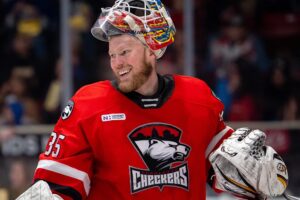by Bob Crawford || AHL On The Beat Archive
Greg Moore is one of a number of young forwards who started their pro careers with the Hartford Wolf Pack last season, and like all of his fellow rookies, he joined the Pack having had outstanding success at his previous level of development.
Moore had spent four excellent years skating for the University of Maine Black Bears, one of the most successful college programs in the country. He had captained the Black Bears’ squad his senior year and was Hobey Baker Award finalist, after scoring 28 goals in 41 games.
On top of that, he had performed strongly in a late-season stint with the Wolf Pack, notching a goal and an assist in a pair of regular-season games and seven points 13 playoff contests. After a strong training camp with the Rangers, the Lisbon, Maine, native appeared poised to make a big impact on the AHL in his first full season.
Not that his rookie year last year was a dud, but it didn’t meet with Moore’s own expectations. He was held to one goal in his first nine games and finished with eight goals and 25 points in 79 games. The transition from the college game to the professional game, and the college life to the professional life, is often a difficult one for even the most successful of college players, and Moore feels that he has benefited from having to battle through that transition.
“Physically I feel strong,” he says of his approach to year two of his pro career. “I feel fast and I feel strong in the corners and along the walls. I think when I came here at the end of my senior year (in 2005-06) I was still strong. We only played two games a weekend (in the NCAA), so during the weeks you could lift and stay strong and healthy during the season. And last year it was kind of a long, grueling year for me. I really didn’t know how to take care of myself. I put on some weight and really just felt slow and sluggish and it really just drained the energy out of me and was a tough year for me.
“In the summer I lost some weight and got myself back to where I thought I was during my senior year in college. The conditioning aspect of it has given me a lot of confidence going into this year.”
Moore’s overall approach to the experience of being a professional player has changed somewhat also, what with not having the responsibilities of studying and classwork to fill his time.
“It’s been a tough adjustment,” he says. “That kind of added to my year last year, just mentally feeling like you’re in a funk of, you leave the rink and what do you do now? There are no classes, there’s no homework and you’re just trying to find a hobby or something to do to occupy your time. It’s good to get away from the game of hockey because you’re at the rink so much and around it so much, and you don’t want to become consumed with it to the point that you get mentally burned out. School stuff allowed you to get away from it. This year I’m going to take a new approach, just trying to have some more fun off the ice and kind of getting away from things and clearing my mind, and hopefully that will help. It’s a long year.”
Having been a premier offensive player in Hockey East for most of his college career, Moore is looking to make this year seem a little shorter by being a significantly bigger contributor to the Pack attack this season.
“I haven’t specifically looked at a goal for numbers, but obviously I want to produce more than I did last year,” he says. “At Maine I got comfortable, I was more of an offensive threat. I think last year was just a good learning experience for me, especially with the schedule being so much different from college, just learning what it takes day in and day out to take care of your body and the grind of a full season. I am going to take that experience from last year and put it into this year and use those tools to have a more productive year.”
Ironically, the fact that Moore struggled last season to put up the kind of numbers that he had been accustomed to in college led him to shine in another very important, but less glamorous, aspect of the game, that being the penalty kill. He scored two shorthanded goals during the season, one of four players on the club with multiple shorties, and used his foot speed and good size to disrupt opponents’ power play attacks on a regular basis.
“It’s always a role that I really take a lot of pride in,” Moore says of getting out there on the penalty kill. “Obviously any forward wants to be on the power play and score all the goals, but I’ve had ups and downs in my career and there have been times when I’ve really relied on the penalty killing and defensive situations to give me my ice time. And last year was one of those situations. I wasn’t producing offensively as much as I would have liked, and I took a lot of pride in penalty killing. I’ve always been one of the top penalty killers on most of the teams I’ve played on in the past. It’s something I take as a great challenge and work hard at and want to be one of those guys that you can rely on to kill penalties.
“It just adds another tool to your toolbox,” he continues, “and hopefully people notice that. I try to add every little possible part to my game, whether it’s taking draws on the right side or penalty killing and hopefully at some point if I get my offense going, getting on the power play. I know Coach (Ken) Gernander feels confident throwing me at center if he needs somebody to fill in at center, and I feel confident playing at all three forward positions, so those little tools help me for the future and to get more ice time.”
Moore is one of those holdovers from last season that are getting used to having Gernander as the head coach, and not having former head man Jim Schoenfeld giving them input on a regular basis.
“It’s been kind of different,” the 23-year-old Moore says of that adjustment. “Obviously every coach has his own style and his own way of doing their things, and I enjoy Coach Gernander just as much as I did Coach Schoenfeld. Different personalities, but can get the job done equally well in their own ways.”
And when it comes right down to it, Moore reports, the similarities outweigh the differences.
“Coach Gernander learned a lot from Coach Schoenfeld,” he says. “Practices are run pretty similar, and that’s good because we pride ourselves on being a well-conditioned team. And in our team systems, not much has changed when it comes to how we want to play hockey as the Wolf Pack. That’s good, that we don’t have to make too many adjustments.”
Like last season, the Wolf Pack are starting this year as a very young club, although the bountiful rookie crop from last year all has a year of experience under their collective belts. One might think that, based on the fact that he was a captain at U. Maine, Moore might feel some pressure to shoulder a big part of the leadership burden, but his feeling is that there are plenty of leaders inspiring the Wolf Pack locker room.
“I don’t know if I’m trying to exert too much leadership,” he says. “There are some other guys on the team that have a lot more experience than I do and are a little older. I’m just trying to come to the rink and work hard every day and try to set a good example for myself and hopefully others will do the same.
“I think everyone’s pretty good at not stepping on each other’s toes, especially the older guys. Guys like (Dave) Liffiton and Jake Taylor are going to be great leaders vocally for us, in the dressing room and on the ice.”
One year older and wiser, and feeling physically sharp, Moore now looks to recapture the feeling and the role that he enjoyed as a collegian, which he looks back on fondly.
“Just the experience of being in key situations, playing in Frozen Fours,” is what Moore says sticks out in his mind most from his past success. “My four years in Maine I got the chance to play in the World Juniors twice. Just feeding off of those experiences, especially my last two years there (at U. Maine), just being one of those go-to guys that they look to on the ice. Hopefully these next couple of years I can start producing more and start becoming one of those guys again, get that freshman, rookie year out of the way and move forward from there.”





































